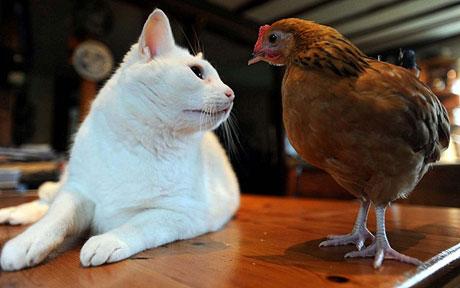- Like
- Digg
- Tumblr
- VKontakte
- Buffer
- Love This
- Odnoklassniki
- Meneame
- Blogger
- Amazon
- Yahoo Mail
- Gmail
- AOL
- Newsvine
- HackerNews
- Evernote
- MySpace
- Mail.ru
- Viadeo
- Line
- Comments
- SMS
- Viber
- Telegram
- Subscribe
- Facebook Messenger
- Kakao
- LiveJournal
- Yammer
- Edgar
- Fintel
- Mix
- Instapaper
- Copy Link
Earlier this week, the New York Times featured an article highlighting the increasing number and strength of criminal prosecutions for animal abuse. Conspicuously absent, however, was any discussion of the criminal categorization, or lack thereof, of farm animal abuse.
Only two federal laws – the Humane Methods of Slaughter Act and the so-called 28 Hour Law – minimally protect animals raised for meat, milk, and eggs. These laws only apply to the transport and slaughter of farmed animals — they don’t apply at all to the treatment of these animals while they’re on the farm, which is where they spend most of their lives and endure the most suffering. Moreover, no prosecution has been brought over the past 50 years under the 28 hour law when farmed animals are transported without food, water, or rest. Worst of all, neither of these federal laws apply to birds, despite the sad reality that of the 9 billion or so farmed animals killed for food last year, approximately 8.5 billion were chickens.
State anti-cruelty laws (under which most pet abusers are prosecuted) are notorious for their farmed animal exemptions. For example, in North Carolina where COK recently uncovered horrendous abuse on a chicken factory farm, it is a misdemeanor if “any person shall intentionally overdrive, overload, wound, injure, torment, kill” any animal or deprive the animal of necessary sustenance. However, this law explicitly exempts so-called “lawful activities conducted for the primary purpose of providing food for human or animal consumption.” Lawful activities in this sense typically include standard agricultural practices such as beak trimming, tail docking, and intensive confinement. Sadly, despite our investigation revealing acts as egregious as intentionally burying chickens alive, authorities chose not to file criminal charges.
As long as pigs, cows, and chickens are exempted from our expectation that animals should be treated with dignity and respect, it should come as no surprise that law enforcement authorities often decline to pursue the mistreatment of farmed animals. We can change this attitude by encouraging the application of anti-cruelty statutes to farmed animals and by standing up for animals whenever we sit down to eat.

